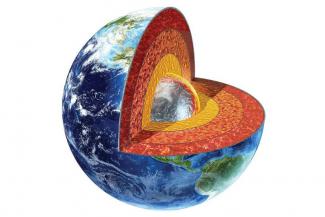NETL’s geological and environmental systems (GES) research tackles the challenges of clean energy production by focusing on the behavior of natural systems at both the Earth’s surface and deep within the subsurface.
In 2021, GES researchers led multiple projects to enable the safe and permanent storage of carbon dioxide (CO2), a greenhouse gas, in underground formations. They also developed and refined innovative tools to control and monitor fluid flow in porous and fractured media in the subsurface — essential for recovering fossil energy resources with greater efficiency and reducing environmental risk — and advanced solutions to treat wastewater at power plants.
Notable achievements in NETL’s GES research in 2021 included:
- To meet aggressive decarbonization goals set by the Biden Administration in the fight against climate change, NETL developed toolsets such as CO2-SCREEN (Storage prospeCtive Resource Estimation Excel aNalysis) to advance carbon capture and storage technology development. Deployment of CO2-SCREEN will provide reliable and accurate CO2 storage estimates for a wide variety of geological formations, allowing governments, industries and other stakeholders, including local communities, to confidently explore geologic carbon sequestration options that will help achieve net-zero carbon emissions in the energy sector by 2035 and the broader economy by 2050.
- GES researchers developed a novel geospatial data method for modeling and predicting geologic structural complexity within the subsurface. In an article published in the Journal of Structural Geology, the researchers explained how their tools and techniques enhance the ability to predict the storage and behavior of CO2, natural gas and other resources within the subsurface. This innovative research also enables hydrocarbon extraction at reduced cost and with greater efficiency while leaving a lighter environmental footprint. NETL’s data science method aims to improve predictions in areas both with and without high-resolution subsurface data through the development of a knowledge-data framework and leveraging the Spatially Integrated Multivariate Probabilistic Assessment (SIMPA) tool and methodology.
- NASA’s Jet Propulsion Laboratory (JPL) and Honeybee Robotics turned to NETL’s GES experts to complete the book “Advances in Terrestrial Drilling: Ground, Ice, and Underwater.” The book details the latest drilling and excavation principles and processes for terrestrial environments. Many years of research by the U.S. Department of Energy in this area were detailed, including NETL’s offshore research. The book chapter, “Environmental Drilling/Sampling and Offshore Modeling Systems,” features NETL’s Offshore Risk Modeling suite, which is a product of six years of research to harness big data capabilities that comprise eight innovative science- and data-driven computational tools and models designed to predict, prepare for and prevent future oil spills.
- GES researchers played a significant role in developing NETL’s Science-informed Machine Learning to Accelerate Real-Time (SMART) Decisions in Subsurface Applications initiative. SMART is bringing the subsurface environment to life through the development of an innovative, user-friendly and intuitive visualization solution. SMART is a 10-year, multi-organizational effort with the goal of transforming interactions within the subsurface and significantly improving efficiency and effectiveness of field-scale carbon storage and unconventional oil and gas operations.
- Flue gas desulfurization (FGD) systems scrub gas generated during combustion to mitigate the release of pollutants such as sulfur oxide and mercury into the atmosphere. Scrubbing operations at fossil energy plants produce complex wastewater. Under the guidance of her mentor, Djuna Gulliver, Ph.D., Preom Sarkar, an Oak Ridge Institute for Science and Education fellow, conducted research on water management of power systems, with a specific focus on the biological treatment of FGD systems. The research will enrich, identify and characterize the anaerobic microorganisms native to FGD to optimize biological treatment systems.
Click here to learn more about the goals and accomplishments of NETL’s geological and environmental systems research.
NETL is a U.S. Department of Energy national laboratory that drives innovation and delivers technological solutions for an environmentally sustainable and prosperous energy future. By leveraging its world-class talent and research facilities, NETL is ensuring affordable, abundant and reliable energy that drives a robust economy and national security, while developing technologies to manage carbon across the full life cycle, enabling environmental sustainability for all Americans.




